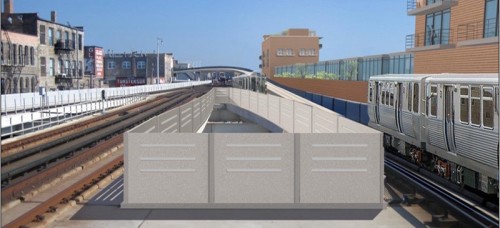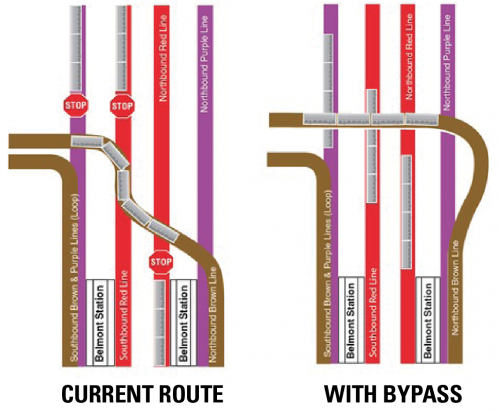
Comparing the railroad bottleneck just north of Belmont where northbound Brown Line trains cross over Red and Purple Line tracks to “a traffic signal in the middle of a busy interstate highway,” the Chicago Transit Authority (CTA) announced plans for an elevated bypass to eliminate train delays. The Belmont flyover is a highly contested project that would cost an estimated $320 million, with construction spanning three to four years.
The flyover is part of the CTA’s Red-Purple Modernization (RPM) Project, a development first announced in 2014 intended to renovate Red Line tracks from Belmont to Howard and Purple Line tracks from Belmont to Linden. “The rail infrastructure on those lines is simply not designed to handle 21st-century rail transit,” Brian Steele, a CTA spokesman, said.
While renovations are inevitable for the nearly 100-year-old tracks, not all Lakeview residents are convinced the Belmont flyover is a necessary project. The CTA has stated that the average wait time for Brown Line trains to cross the Red and Purple Line tracks is just 84 seconds, and some area residents argue even that is a stretch. “I live right off the Belmont stop and I’ve honestly never had to wait more than like 30 seconds (for the Brown Line to cross),” Alyssa Rehn, 20, said.
A group of Lakeview residents have banded together to protest the Belmont flyover, a project that at its highest would reach 40 to 45 feet. The Coalition to Stop the Belmont Flyover supports renovating the existing tracks, but believes the Belmont flyover is an unnecessary waste of $320 million that will destroy Central Lakeview and Clark Street. It also opposes the demolition of 16 business and residential buildings to make room for the bypass.

The coalition is not alone. A referendum placed on Nov. 4, 2014 asked residents in the 20th, 35th and 38th precincts of the 44th Ward the following question: “Has the CTA sufficiently justified the $320 million proposed Brown Line flyover project and its impact on local homes and business?” Of the 807 that cast their ballot, 72 percent voted “no.”
Ald. Tom Tunney of the 44th Ward released a statement that aligns with the concerns of the coalition. “I have great concerns about the impact of this project, specifically the new structure, the viability of the parcels that remain and the effect this proposed project would have on the quality of life of our residents,” he said. “I will press hard on the CTA to ensure that they fully justify the need for this project.”
A public hearing regarding the project’s Environmental Assessment (EA) will be held June 3 in the gymnasium at 3656 N. Halsted St. The CTA will also be accepting written comments mailed to their Strategic Planning office until June 18. If the RPM project goes according to plan, design and design builders will be finalized in 2016 or 2017, with construction beginning as early as 2017.
As CTA officials look to the future, they see the Belmont flyover as a vital addition to Lakeview and the rest of Chicago. “This is not about three to four minutes,” CTA spokeswoman Tammy Chase said. “This is about six to eight decades of investing in the future. This is about enough train service in the future.”
The Belmont flyover’s opposition is forward thinking as well. In an open letter to the incoming CTA President Dorval Carter, the coalition directly stated their concerns. “CTA officials have not made the case that any time savings would be significant. The project, opposed by neighbors in Lakeview, is a solution to a problem that doesn’t yet fully exist.”
‘Red Ahead’
Lawrence, Argyle, Berwyn, and Bryn Mawr stations and tracks to be rebuilt
Projects meant to expand capacity on north Red Line, where ridership is expected to grow significantly